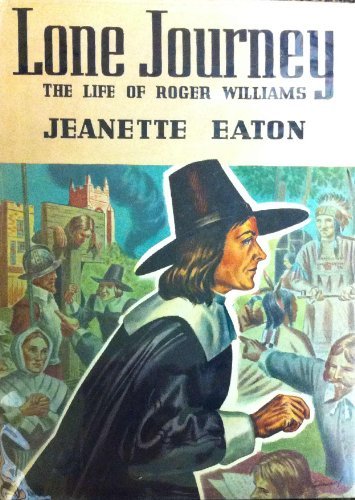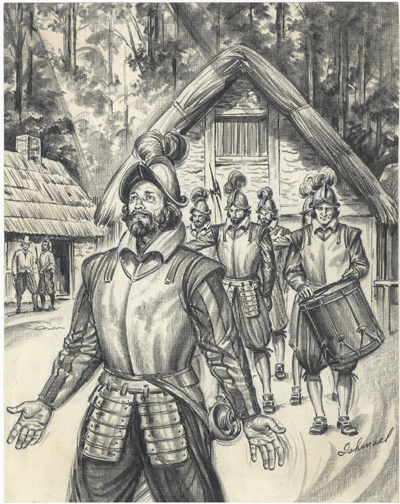
Lone Journey: The Life of Roger Williams by Jeanette Eaton. Illustrated by Woodi Ishmael.
Four of Jeanette Eaton’s books received the Newbery Honor (runner-up), but her books, mostly biographies for young adults, never won the Newbery Medal. Lone Journey was published in 1944, and was a Newbery Honor book in 1945.
I found the book quite fascinating in its portrait of a man who was ahead of his times in many ways. Roger Williams began life in an orthodox Church of England family, became a Puritan as a youth, and then moved on to become a separatist and a dissenter who certainly preached and believed in Christ but eschewed all churches and denominations as holding undue sway and authority over the conscience of the individual. Williams, according to the book, made a life study of government and the relationship of church and state, and he came to the conclusion that the civil authority and the church were to be wholly separate, ruling in different spheres, and that the individual conscience before God was to reign supreme in matters of religion.
Betsy-Bee just read Nathaniel Hawthorne’s The Scarlet Letter for her English class, and we had a good discussion of which of God’s laws were to be enforced by the state (laws against murder and theft and others of what Williams would call “civil crimes”), which laws should be enforced by the church upon church members (laws against gossip, profanity, adultery, and other sins, perhaps?), and which laws were up to the individual before God. Or should the church become involved at all when its members sin against one another? How should the church discipline its members, if it does?
The Massachusetts Bay colony and its leaders eventually banished Roger Williams, but his exile turned out to be a blessing in disguise, even though it entailed much hardship, since he was able to found a colony in which:
“We have no law among us, whereby to punish any for only declaring by words theire mindes and understandings concerning the things and ways of God.”
In a letter to a friend, Roger Williams wrote of the colony of Rhode Island and Providence Plantations:
” . . . We have long drunk of the cup of as great liberties as any people that we can hear of under the whole heaven. We have not only long been free (together with a New England) from the iron yolk of wolfish bishops, and their popish ceremonies, but we have sitten quiet and dry from the streams of good spilt by that war in our native country.
We have not felt the new chains of the Presbyterian tyrants, not in this colony have we been consumed with the over-zealous fire of the (so-called) godly christian magistrates. Sir, we have not known what an exise means; we have almost forgotten what tithes are, yea or taxes either, to church or commonwealth.”
Williams was a friend to the native Americans of the colony, and he led the colony to accept both Quakers and Jews as full citizens with the rights to vote and own land. He was a preacher and a practitioner of religious liberty for all, and it is from Roger Williams and others who followed in his footsteps that we learned many of the principles that eventually went into the U.S. Constitution and became enshrined in American government and culture. This biography is somewhat fictionalized, with dialog that is obviously made up, but the events of Roger Williams’s life are faithfully chronicled, as far as I could tell.
Jeanette Eaton was a prolific biographer, and she wrote biographies of all of the following persons over the course of her career:
A Daughter of the Seine: The Life of Madame Roland (1929) (Newbery Honor 1930)
Jeanne d’Arc, the Warrior Saint (1931)
The Flame, Saint Catherine of Sienna (1931)
Young Lafayette (1932)
Betsy’s Napoleon (1936)
Leader By Destiny: George Washington, Man and Patriot (1938) (Newbery Honor 1939)
Narcissa Whitman: Pioneer of Oregon (1941)
Lone Journey: The Life of Roger Williams (1944) (Newbery Honor 1945)
David Livingstone, Foe of Darkness (1947)
That Lively Man, Ben Franklin (1948)
Buckley O’Neill of Arizona (1949)
Washington, the Nation’s First Hero (1951)
Gandhi, Fighter Without a Sword (1950) (Newbery Honor 1951)
Lee, the Gallant General (1953)
The Story of Eleanor Roosevelt (1954)
Trumpeter’s Tale: The Story of Young Louis Armstrong (1955)
America’s Own Mark Twain (1958)
Wikipedia calls Eaton a “suffragist” and a “feminist”, but judging from the subjects of her books, she also had an interest in religion and religious leaders.
Woodi Ishmael, whose woodcut illustrations, grace the pages of Ms. Eaton’s book, seems to have been a rather successful World War II era illustrator, producing numerous advertisements and drawings and paintings for the armed forces, especially the Air Force. You can look at some of his Air Force artwork here. And here’s a blog post that shows several of Mr. Ishmael’s illustrations for another Eaton bio, Narcissa Whitman.

I’d love to have access to all her books! My girls love biographies, and hers sound really good!
Pingback: Junior Scholastic Magazine Gold Seal Award | Semicolon
Pingback: What’s New in the Library? November 1, 2016 | Semicolon